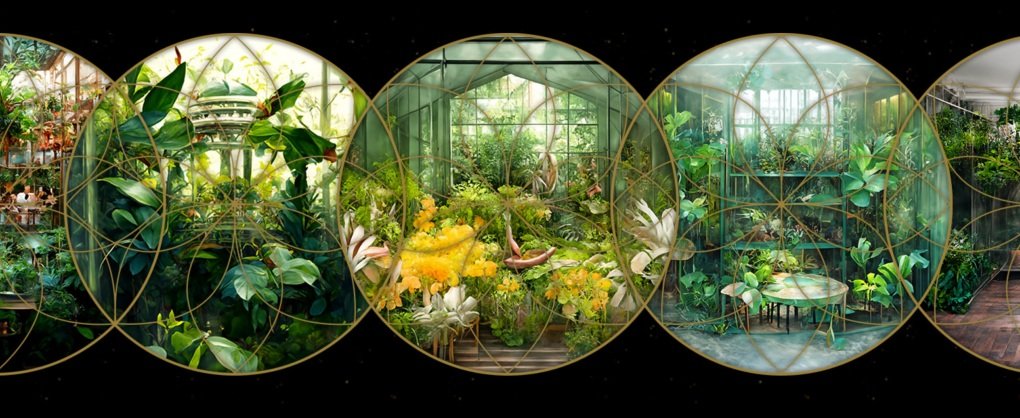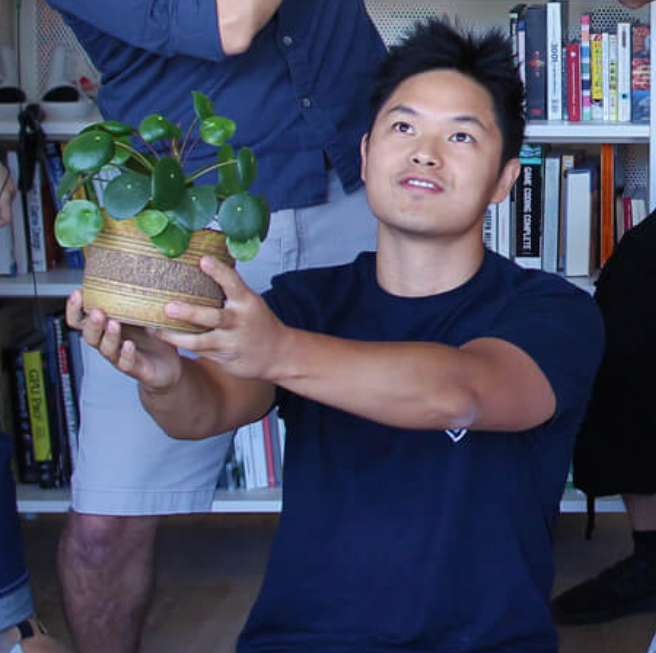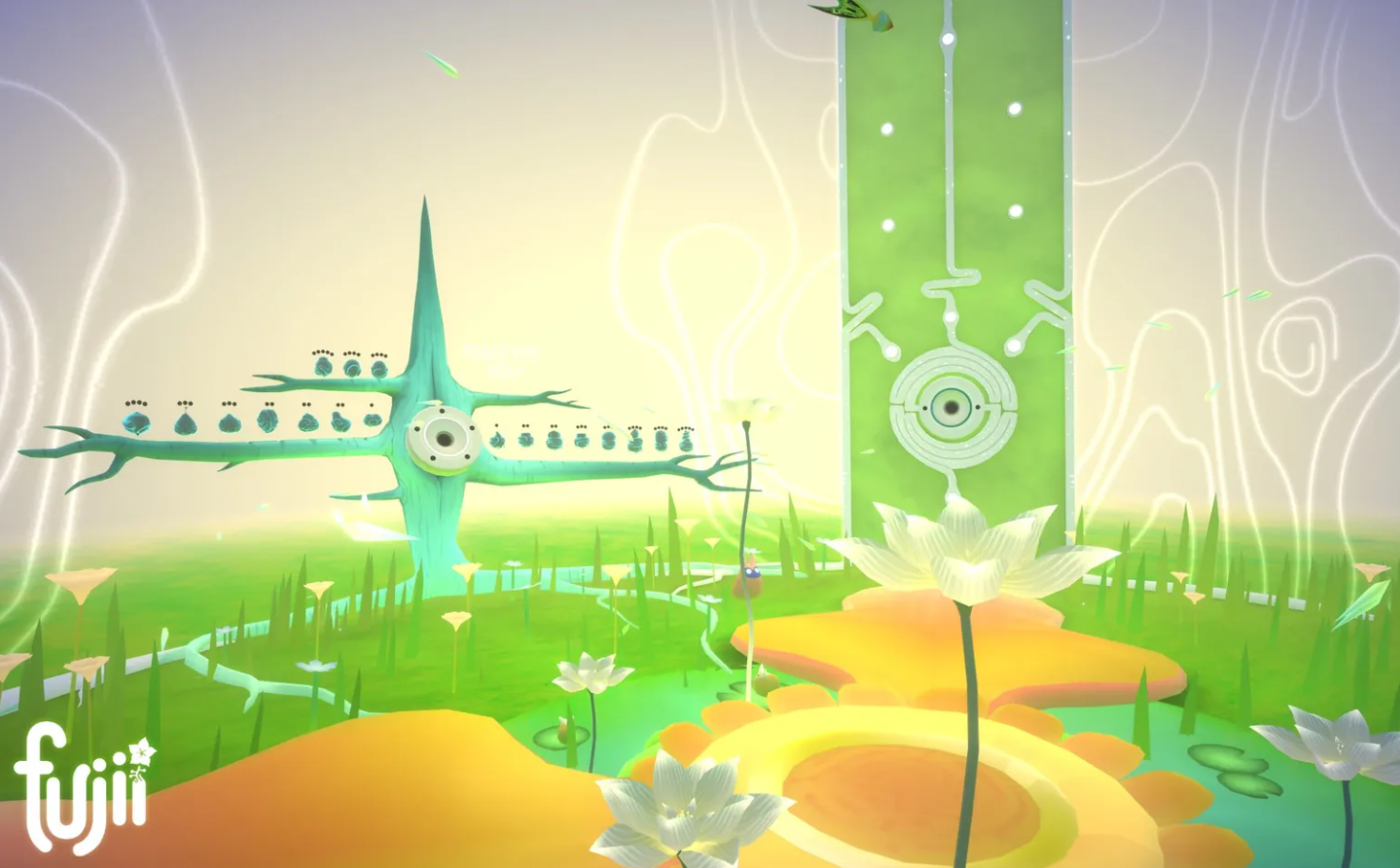Meditation Meets VR in Fujii’s Trippy Garden
The following article was originally published by Lucid News under “Dear Future”—a monthly column that explores the rise of transformative entertainment and how it can be a foundational pillar, alongside psychedelics, in the field of mental health and wellness. You can see the original publishing here.
Eddie Lee is an artist, programmer and founder of the game studio Funktronic Labs. He is the creator of Fujii, a groundbreaking virtual reality (VR) experience where meditation meets galactic gardening. He’s also the artistic force behind the VR space game Cosmic Trip, and other games that explore the intersection of art, technology, and human connection within virtual worlds.
Lee continues to push the envelope of what’s possible inside virtual spaces, designing immersive and transcendent game experiences with wide appeal. In this interview, he discusses VR as a healing and wellness modality, how technology is affecting the evolution of human consciousness, psychedelics and VR, and more.
You’ve said that your goal is finding the intersection between art and technology. What does that mean for you?
What interests me is how technology can be leveraged as a means of human expression. A clear example would be music tools. Traditionally, someone who expresses themselves musically would have decades of experience perfecting an instrument like piano, guitar or cello. But with modern technology, people express themselves musically in a way that doesn’t require years of classical training.
When I was a kid, I used to draw a lot but I never felt like I was good or proficient, that I had an innate talent for it. So I kind of weaned myself off of it. But in college I found programming and generative procedural art, and it all made sense to me. It allowed me to express myself in a way that was not previously possible. I’ve always felt limited by my physical skill. Through coding, I was able to make art. That’s the genesis of this idea around art and technology.
With Fujii do you feel you’re pushing the boundaries for VR regarding wellness and self-transformation? What led you to create that game?
The core focus of Fujii is around plants as therapy. For me, gardening has been a positive influence. It allows me to relax and think and have this introspective, meditative time where I connect to nature.
How can I synthesize a lot of this positivity and ease around gardening into a medium? That was a concept for virtual reality. It’s a perfect medium, because you can touch, interact, and play with the plants and have them respond to you in a way that wasn’t possible before. With traditional console games, with the controller it never felt like you could touch things in the game. The controller has been an obstruction. VR is a direct connection. Physically touching plants is like therapy. How do we build an entire experience around that? That’s what Fujii became.
How do you feel like this could push us further into the future with the technology we have now?
I’ve been playing a lot with generative Artificial Intelligence arts. A good example is GPT-3, where they use text prompts to generate images. That’s what we’re doing with our Dream Seed project where all the art is completely generated using GPT-3. It looks almost like photorealistic art. How do we take that to the next level? Right now it takes a minute to generate one static image, but imagine that in 10 years it becomes so efficient that AI can spit out two frames a second. So you can literally go into these VR worlds that generate stereoscopic images, where you can just go in and live this infinitely full experience. When it actually gets to that point, it’s going to be a lot more powerful than people realize.
Imagine saying we want to go explore a psychedelic underwater experience together. And then it generates this stereoscopic real time environment where it’s just perfect, almost photorealistic, using AI. That’s a place I hope we can explore in the future.
Would you combine psychedelic experiences with VR?
I don’t have personal experience with mushrooms and VR, but I do think there is potential there. Sometimes I smoke weed and like going into VR. You feel very open to the experience, to receiving something new.
But I also think we should be very careful. Because with VR, things feel real. I remember when I tried TheBlu for the first time. You see a whale swimming past you, and it feels like it’s there, its eyes look at yours, all the particles swaying. My mind was so receptive. If there are enough signals to trick your brain into thinking something is real, it’s almost indistinguishable from reality.
How has cannabis inspired you creative process while developing these virtual worlds?
When I smoke weed, I feel less encumbered. There’s a lot of stuff in my life that weighs on me. When I sit down and try to create, I start thinking about things that are not my art. Weed allows me to relax and be in the moment. When you’re relaxed and present is when you’re able to create the best works of art.
How do you see technology affecting the evolution of human consciousness?
In terms of consciousness, it remains to be seen. I am hopeful that these technologies will hold a mirror to ourselves, and that VR will allow people to experience worlds and extend their experiences beyond the limits of where they are, or what they were born into.





